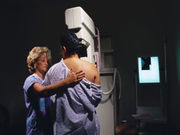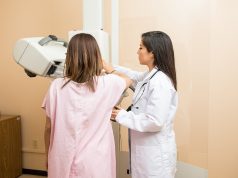But researcher stresses that risk is small
THURSDAY, Dec. 3, 2015 (HealthDay News) — Women who receive a false-positive result on a mammogram may be at increased risk of developing breast cancer later, according to research published online Dec. 2 in Cancer Epidemiology, Biomarkers & Prevention.
Louise Henderson, Ph.D., an assistant professor of radiology at the University of North Carolina at Chapel Hill, and colleagues analyzed national breast cancer data from 1994 through 2009. They looked at the results of more than 2.2 million screening mammograms done on nearly 1.3 million women in different parts of the United States. The women were aged 40 to 74. After an initial screening, the researchers tracked the women for up to 10 years, looking to see if a false-positive was linked with breast cancer risk later.
Compared to women with a negative result, those who got a false-positive and were referred for more tests had a 39 percent higher risk of developing cancer during the follow-up period. Women referred for a biopsy had a 76 percent higher risk of developing breast cancer than women with a negative result.
While those increased risks sound high, they need to be put into perspective, Henderson told HealthDay. For women who got a false-positive and were sent for more imaging, compared to those who got a negative result, about one or two additional women would develop breast cancer in the next decade, she said. In addition, for a false-positive that led to a biopsy, an additional one to three women would develop breast cancer later.
Copyright © 2015 HealthDay. All rights reserved.








